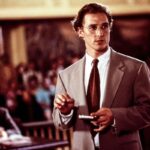The Big Short: Vulgar Display of Power, by David Bax
For a lot of people, The Big Short will probably be the movie that leads them to take director Adam McKay seriously. The film is a stunning and ferocious blast of righteous anger and go-for-broke comedy and thus that outcome is well-deserved. Still, many of these folks will be upgrading McKay for the wrong reasons. This isn’t his coming out because it’s his first movie that’s not a pure comedy. His comedies are triumphs in their own right; Anchorman in particular is a modern classic of absurdist, anti-narrative cinema that deserves to be studied in film schools for decades to come. No, The Big Short represents a leveling up for McKay because, for all its big stars, its massive info-dumps and its based-on-a-true-story scale, the film’s motivations come across as intensely personal.
Brad Pitt, Christian Bale, Ryan Gosling, Steve Carell, Finn Wittrock, Hamish Linklater and others play a disparate group of bankers and investors who, around 2005, all come to the realization that America’s housing market is in a bubble and is set to go off like a time bomb. Some of them, like Carrell’s Mark Baum and Pitt’s Ben Rickert, consider themselves idealists, sickened by the major banks’ disregard for the American people and the law. But all of them are opportunists. And so they begin to buy insurance swaps to the tune of over a billion dollars, in effect betting against the housing market. They became almost unfathomably wealthy when the crash finally came and also earned a mix of ire and respect for being the few who saw it all coming.
What these men (and they are all men) did requires the explanation of quite a lot of complex financial and economic ideas and practices. McKay accomplishes this with some cheeky, fourth wall-breaking direct addresses. He does not, however, use the characters themselves for these, like Jordan Belfort attempting to explain an ISP in The Wolf of Wall Street. The method he does use I will leave unspoiled. Yet he has the characters talk to the camera for another reason, which is to remind you that you’re watching a recreation of events. In a hilarious moment that will come as a relief to sticklers for accuracy, Wittrock pauses to inform the viewer that the scene we’re watching never actually happened; it’s an amalgamation intended to streamline events for expedience and entertainment purposes. That moment pays off even further when Gosling later lets us know that a particularly movie-ish moment actually did happen exactly as depicted.
This postmodernist technique serves a purpose beyond the meta-textual poke at screenwriting conventions. It’s one of a handful of elements – like the intentionally clunky ADR in the 1970s prologue and the conspicuously terrible wigs worn by half the cast – which imply that McKay’s not just engaged in retelling these events. He’s ridiculing them. The layer of falseness is by design, like when one person in a heated argument repeats back what the other person said in a mocking voice. It’s funny, yes, but it’s the product of barely held together rage.
McKay’s anger is also reflected in his musical choices. Bale’s Michael Burry prefers to listen to bands like Mastodon, Metallica and Pantera while crunching numbers and the film takes its cues from there. Even when it’s not metal, it’s fiery and ferocious (Run the Jewels make an appearance on the soundtrack, for one example) and it’s loud. It’s always loud. Along with the assaultive tunes, McKay favors a brash, mosaic style of editing in the montages that signify the passage of time between sections, filling them not only with images of national events that roughly mark the dates but also with various still shots of Americans in their daily, domestic lives. That it’s tough to tell if these are found or staged is to McKay’s credit.
McKay has a lot of information and opinions that he wants to impart. He doesn’t have the assertive grace of Charles Ferguson’s Inside Job but he avoids tedium – and even surpasses that essential documentary – by being so heartfelt, even soulful, in his scolding. The Big Short is both the defining film about the most recent financial crisis and the defining film of its director’s young career so far.






























